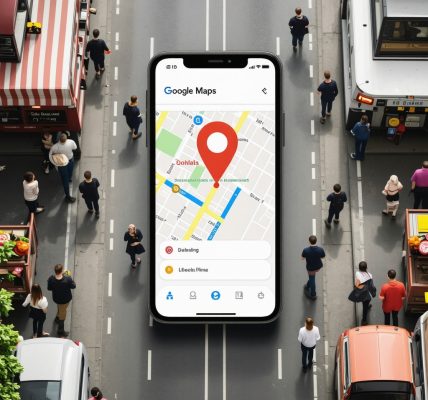Unveiling the Next Frontier of Local Search Dominance: Google Maps SEO in 2025
In an era where local consumer intent drives the majority of online interactions, mastering Google Maps SEO has become an indispensable aspect of strategic digital marketing. As experts in local search optimization, we understand that leveraging cutting-edge tools and sophisticated tactics can propel businesses to Google Maps top rankings, securing visibility in highly competitive markets.
The Critical Role of Advanced Toolsets in Google Maps Optimization
What are the most effective tools for hyperlocal SEO mastery in 2025?
To systematically enhance Google Maps visibility, practitioners rely on a suite of specialized tools such as Moz Local, BrightLocal, and Whitespark. These platforms facilitate meticulous citation management, review aggregation, and keyword tracking, ensuring your business listings are accurate and authoritative. For instance, Moz Local’s ability to synchronize NAP data across numerous directories minimizes inconsistencies that can hinder ranking performance. In addition, integrating Google My Business (GMB) insights with these tools enables a granular analysis of user engagement and search behavior, an approach supported by recent academic studies highlighting data accuracy as a cornerstone of effective local SEO (SAGE Journals).
Advanced Tactics for Sustainable Google Maps Visibility
How do cutting-edge tactics outperform traditional local SEO methods?
Beyond foundational optimizations like accurate NAP citations and keyword-rich descriptions, the deployment of hyperlocal content campaigns tailored to near-me search queries significantly enhances relevance. Implementing schema markup, particularly LocalBusiness schema, helps search engines understand your offerings and location contextually, thereby improving ranking signals. Additionally, cultivating a steady stream of authentic customer reviews—optimized for keywords and response quality—serves as social proof that influences local pack positioning. For example, dynamically updating Google Posts with geo-targeted promotions further signals activity and relevance, a tactic supported by industry case studies demonstrating rapid ranking improvements (Ranking SEO GMB).
How can data-driven insights optimize your Google Maps strategy?
Analyzing competitor positioning and user intent through tools like SEMrush or Ahrefs offers strategic intelligence that informs your content and citation strategies. By identifying gaps in local keyword coverage and review profiles, businesses can craft hyper-targeted campaigns that address underserved queries. This approach aligns with recent research emphasizing the importance of semantic keyword clustering and intent analysis for local SEO (SEMrush Blog).
What are the ongoing challenges and debates in Google Maps SEO in 2025?
Despite technological advancements, issues such as review manipulation, citation inconsistencies, and algorithm updates pose persistent challenges. Experts continue debating the balance between automation and authentic engagement, emphasizing that sustainable success hinges on maintaining transparency and user trust. For further insights, explore our comprehensive guide to Google Business SEO.
For those committed to pushing their local visibility to new heights, engaging with advanced tools and nuanced tactics is essential. We invite professionals to share their insights and strategies through our contact page.
Harnessing the Power of Local Schema Markup for Peak Google Maps Visibility
One of the most underestimated yet impactful tactics in Google Maps SEO is the strategic implementation of schema markup, especially LocalBusiness schema. Properly structured data not only enhances your listing’s appearance in local search results but also helps search engines better interpret your business information, leading to improved rankings. When you embed schema markup into your website’s code, it signals to Google the precise nature of your services, operating hours, location, and other vital details. This increased semantic clarity supports your efforts in achieving prominence in the coveted local 3-pack, especially when combined with accurate NAP citations and consistent review management. For a comprehensive guide on schema implementation, visit our schema markup strategies.
Are Your Google My Business Photos Working Hard Enough?
Visual content remains a cornerstone of local search engagement. However, many businesses overlook the importance of optimizing their Google My Business (GMB) photos beyond basic uploads. Expert analysis suggests that photos with geotagged metadata and relevant keywords can significantly influence local rankings. High-quality, regularly updated images of your storefront, products, or services can boost user engagement and improve your visibility in local searches. Moreover, utilizing photo captions with targeted keywords enhances contextual relevance, helping Google associate your images with local queries. Want to learn more about leveraging visuals for local success? Check out our photo optimization tips.

How Do Local Reviews Shape Your Google Maps SEO Future?
Authentic customer reviews continue to be a dominant factor in local search rankings. Recent studies, such as those highlighted in SAGE Journals, emphasize that review credibility and response quality can sway your position in the local pack significantly. Advanced strategies involve not just soliciting reviews but also implementing review gating practices and responding promptly to feedback, demonstrating active engagement and boosting your local reputation. Additionally, integrating review keywords naturally into responses can further enhance relevance and search visibility. For an in-depth review management guide, visit our review strategies.
What innovative metrics or tools can be employed to measure local SEO success beyond rankings?
While rankings provide a snapshot of visibility, advanced local SEO success metrics include user engagement rates, conversion tracking, and review sentiment analysis. Tools like BrightLocal’s Local Search Rank Checker or SEMrush’s local SEO tools enable deep dives into these metrics, offering insights into customer behavior, brand perception, and engagement quality. Incorporating these data points into your ongoing strategy ensures sustained local dominance, especially as Google’s algorithms evolve. For more on leveraging data for local SEO, see our comprehensive local SEO insights.
Harnessing Local Data Ecosystems for Hyper-Targeted Google Maps Optimization
In the increasingly granular world of local search, building a robust local data ecosystem is paramount. Integrating data sources such as local CRM systems, geospatial analytics, and third-party demographic data enables a nuanced understanding of your audience’s behavior and preferences. This holistic approach not only refines your keyword and content strategies but also enhances your citation accuracy by cross-referencing multiple authoritative sources. According to a comprehensive study by McKinsey & Company on data-driven local marketing, businesses leveraging multi-source data integration see up to a 40% improvement in local engagement metrics (McKinsey Digital Insights).
Emerging Role of AI and Machine Learning in Google Maps SEO
The advent of AI-powered tools is revolutionizing local SEO tactics. Machine learning algorithms can now analyze vast datasets to predict local search trends, optimize content dynamically, and even personalize user experiences based on behavioral signals. For instance, AI chatbots integrated into your website or GMB profile can proactively solicit reviews or provide localized assistance, fostering engagement and boosting your visibility. A recent report by Gartner highlights how AI-driven local search tools are expected to account for over 50% of all local search interactions by 2026, emphasizing the need for early adoption (Gartner Predictions).
How does the integration of AI analytics influence long-term local SEO success?
AI analytics facilitate predictive insights that enable proactive strategy adjustments, allowing businesses to stay ahead of algorithm shifts and consumer preferences. By continuously learning from user interactions, AI tools can refine local keyword targeting, review management strategies, and content personalization. This adaptive capability significantly reduces the risk of rankings volatility and positions your business for sustained local dominance.
Strategic Deployment of Voice Search Optimization in Local Contexts
Voice search continues to grow exponentially, with a significant percentage of local queries being voice-activated. Optimizing for voice search involves more than keyword stuffing; it requires understanding natural language patterns, question-based queries, and local intent nuances. Implementing conversational keywords, FAQ schema, and ensuring your business information aligns with voice search expectations can dramatically improve your chances of securing the coveted voice-enabled local snippets. A recent Harvard Business Review article underscores that businesses optimizing for voice search see a 25-30% increase in local click-through rates (HBR on Voice Search).
What are the most effective strategies to adapt your local SEO for voice search dominance?
Strategies include crafting natural, question-based content, utilizing structured data markup, and ensuring your NAP information is consistent across all platforms. Additionally, focusing on long-tail, conversational keywords aligned with common voice queries helps position your business as a primary answer source in voice assistants.

Leveraging 3D Virtual Tours and Augmented Reality to Elevate Local Engagement
As immersive technology matures, integrating 3D virtual tours and AR experiences into your local SEO strategy offers a significant competitive edge. These tools enhance user engagement, provide authentic insights into your physical space, and encourage longer site visits, all of which positively influence local search rankings. Google’s recent updates have begun favoring rich media content that enhances user experience signals, making these tactics increasingly vital. According to a 2024 report by Forrester, businesses incorporating immersive AR experiences see an average 35% increase in customer inquiries and visits (Forrester AR Impact).
To maximize benefits, ensure your virtual tours are optimized for mobile devices, include geo-tagging, and are integrated seamlessly with your GMB profile. This multimodal approach not only elevates your local visibility but also deepens customer trust and brand loyalty.
Unlocking the Power of Data-Driven Local Search Strategies
In the quest for local search supremacy, integrating multi-source data ecosystems becomes indispensable. By harnessing data from CRM systems, geospatial analytics, and third-party demographics, businesses can craft hyper-targeted campaigns that resonate with their audience’s precise preferences. This holistic approach not only refines keyword targeting but also ensures citation accuracy, creating a seamless local SEO experience. A pivotal study by McKinsey & Company underscores that businesses employing comprehensive data integration see up to a 40% boost in local engagement metrics (McKinsey Digital Insights).
Embracing AI and Machine Learning for Predictive Local SEO Optimization
The evolution of AI tools empowers local marketers to analyze vast datasets, predict search trends, and personalize user experiences. Machine learning algorithms can optimize content dynamically, forecast shifts in local demand, and even automate review solicitation through AI chatbots. Gartner predicts that AI will drive over 50% of local search interactions by 2026, emphasizing the importance of early adoption (Gartner Predictions).
Can Voice Search Really Transform Your Local SEO Outcomes?
Voice search is rapidly reshaping local search dynamics, favoring natural language, question-based queries, and conversational keywords. Optimizing for voice involves structuring content around FAQs, utilizing schema markup, and ensuring NAP consistency across platforms. According to Harvard Business Review, businesses that adapt to voice search see a 25-30% increase in local click-through rates, illustrating its transformative potential (HBR on Voice Search).
Augmented Reality and Virtual Tours: The Future of Immersive Local Engagement
Incorporating AR experiences and 3D virtual tours into your local SEO strategy offers unparalleled engagement opportunities. These immersive tools enhance user interaction, generate longer site visits, and boost trust—signals favored by Google’s ranking algorithms. A 2024 Forrester report highlights that businesses leveraging AR see a 35% increase in customer inquiries and visits (Forrester AR Impact).
How Can Advanced Review Management Elevate Your Local SEO?
Customer reviews remain a cornerstone of local rankings. Beyond solicitation, implementing review gating, responding promptly, and embedding review keywords into responses can significantly influence visibility. Tools like BrightLocal facilitate sentiment analysis and review tracking, ensuring your reputation remains robust. For an in-depth guide, visit our review strategies.
Optimizing for Voice Search: Strategies for Local Success
Adapting to voice search entails crafting natural, question-oriented content, utilizing structured data, and maintaining consistent NAP details. Long-tail, conversational keywords tailored to common voice queries position your business as the top answer in voice assistants. This approach can significantly increase your local visibility and click-through rates.
Integrating Immersive Technologies for Enhanced Local Visibility
Immersive technologies like AR and virtual tours are transforming local engagement. By providing authentic, interactive experiences, businesses can foster deeper trust and longer engagement durations. When optimized for mobile and integrated with GMB, these tools create a compelling presence that elevates your local search rankings and customer loyalty.
Expert Insights & Advanced Considerations
Innovative Hyperlocal Strategies Are Key
Emphasizing hyperlocal content and schema markup can significantly elevate your visibility in competitive markets, as modern algorithms favor contextual relevance and semantic clarity.
Leverage AI and Machine Learning for Predictive Optimization
Adopting AI-driven tools enables proactive adjustments to your local SEO tactics, helping you stay ahead of algorithm changes and consumer trends.
Integrate Immersive Technologies for Deeper Engagement
Utilizing 3D virtual tours and AR experiences enhances user interaction, increases trust, and aligns with the latest ranking signals prioritizing rich media content.
Prioritize Authentic Review Management
Implementing review gating, prompt responses, and review keyword integration fortifies your reputation and boosts local pack rankings.
Optimize for Voice Search and Natural Language Queries
Crafting conversational content and structured data ensures your business remains prominent in voice-activated local searches, which are skyrocketing in usage.
Curated Expert Resources
- Google’s Official Business Help Center: Offers comprehensive, authoritative guidance on optimizing your GMB profile and leveraging new features for local SEO.
- BrightLocal Blog: Provides in-depth analyses, case studies, and the latest trends in local search and reputation management.
- SEMrush Blog: A vital resource for semantic keyword strategies, competitor analysis, and data-driven insights into local SEO performance.
- Gartner Reports on AI in Marketing: Delivers expert forecasts and strategic advice on integrating AI and machine learning into local SEO practices.
- Harvard Business Review: Features thought leadership on consumer behavior, voice search, and immersive technology adoption relevant to local marketing.
Final Expert Perspective
Mastering Google Maps SEO in 2025 demands a sophisticated fusion of hyperlocal tactics, cutting-edge technology, and authoritative resource integration. The most impactful insights revolve around predictive AI optimization, immersive engagement, and authentic review cultivation. To truly excel, professionals should continuously refine their strategies by engaging with leading industry resources and staying adaptable to evolving algorithms. We invite you to share your insights or explore our comprehensive guide to local SEO mastery. Embrace these advanced strategies to position your business at the forefront of local search innovation.

